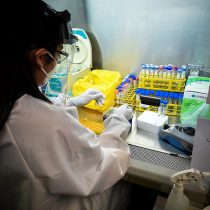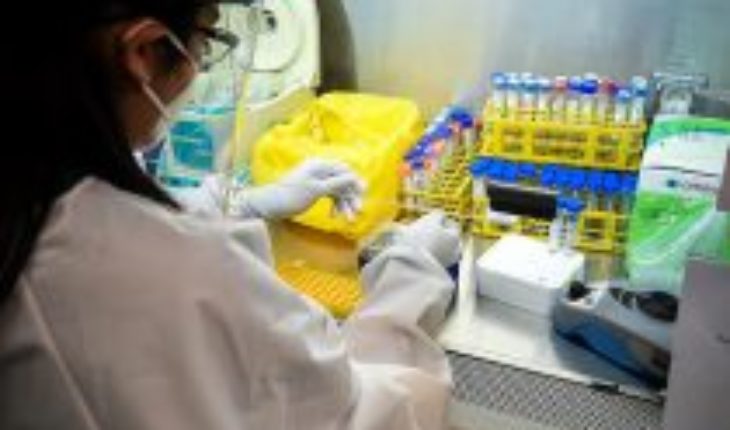
The questioning of the stock of inputs available to cope with the advance of the Coronavirus pandemic has the Ministry of Health under the magnifying glass. The progress of COVID-19 has led to the barrier of 2,000 contagions per day, with 80% of them concentrated, on average, in the Metropolitan Region. Added to this is the reality within the care centres and UCI beds that until 13 May were occupied by 78% in the country, and 93% in MRI. From this Friday at 22 hours, 38 communes in the Metropolitan Region will be quarantined and 42 across the country, resulting in a total of 7.2 million people in confinement.
In recent days, the lack of some inputs to develop The Minsal’s main strategy to address the pandemic was evident: the massive testing of PCR to identify Coronavirus infections in the population. At the beginning of the week the network of laboratories that includes the Institute of Public Health, hospitals, universities and private centers, reported more than 13 thousand tests in a day, the maximum capacity that has been recorded. At the same time, a number of private clinics reported that they should stop taking tests due to lack of PCR kits and reagents in laboratories. Health Minister Jaime Mañalich noted that this suspension would not affect the ability to test and that it only reaches 15% of the network. But, from 2 May onwards the increase in examinations in the country, and mainly in MRI have concentrated in private laboratories. According to the latest Report of the Minsal, of the 325,417 tests reported by the laboratory network, 44.3% are in the private sector. On the other hand, hospitals account for 47.9% of samples – including universities’ laboratories – and the PSI has processed 7.8% of PCR tests.
Last week, El Mostrador revealed that the Central Metropolitan Health Service informed regional services that they would no longer process region tests, due to the large number of tests in the Metropolitan Region. They even added that they would start sending MRI samples to nearby regions. During the weekend, the mayor of Cerro Navia denounces the loss of 1,200 tests corresponding to the Western Metropolitan Service, for exceeding the shelf life. And on Thursday Ciper revealed that the laboratory of the Hospital Lucio Córdova, which processes between 1200 and 1400 samples a day, was left without reagents to process the PCR tests, due to the international stock break that the company Roche, the main supplier of this type of inputs in Chile, has.
As a result of this lack of inputs, another central part of the Coronavirus case identification process has been affected: the implementation of new laboratories. The country currently has a public-private network of 70 laboratories across the country, and departed with 5 in early March. On May 14, 54 of them delivered test results for PCR, and on April 30 the peak of 65 laboratories was recorded informing Minsal.
The network of laboratories is composed of private, hospitals, ISPs and universities, the last three focus on processing PCR tests taken in public health centers and those taken by the regional Health Seremis. Of this group, 20 laboratories correspond to universities, which have been assembled with the support of the Ministry of Science.
But the new, mainly university laboratories were implemented until April 20, according to the Registry record of the Ministry of Science page. According to the information collected by El Mostrador so far there would be at least 14 laboratories and/or public network agreements, pending approval by the Undersecretary of Assistance Networks, Arturo Zúñiga. The undersecretariat would have chosen to suspend the validation of new laboratories due to the small number of reagents in stock of Minsal. It is for this reason that the decrees would remain on the undersecretary’s desk.
Braking laboratories
The authorities have sought to allay concerns about the lack of inputs and a possible stock break. Minister Jaime Mañalich pointed out that these are specific cases, that the tests that would stop at the Lucio Córdova Hospital, which belongs to the Southern Metropolitan Health Service will be retargeted to laboratories that could use reagents of a brand other than Roche. And that they would be given, as a loan, PCR kit to private clinics, stock that would be part of a donation delivered by the CPC.
On Thursday, in an interview with T13 Radio, the Minister of Sciences, Andrés Couve, reiterated – on several occasions – that there is no lack of inputs and that “the system of public and university testing is guaranteed its stock, we have a very significant number”. The laboratory network of universities has a special fund of $1.5 billion, which come from the National Research and Development Agency (ANID) and which aim to strengthen this network, which has not continued to grow, even though several universities gave the information to be validated by the ISP days ago, among them are the medical faculties of the Universidad Mayor and the Pontifical Catholic University.
From one of the institutions that is waiting for Under-Secretary Zúñiga to grant the authorization they explain that the argument given by the Ministry of Health is the lack of stock of reagents to supply new laboratories. “We are at the top,” says a source of The Minsal, who stresses that with current capacity “there is still stock for a few weeks,” the rest should come among donations from China. From one of the waiting labs, they point out that Minsal’s response has been that “they stand, they cannot enable more labs until further notice.”
But, on the desk of Undersecretary Zúñiga, not only would decrees for the approval of new laboratories be pending, but also some agreements between the Metropolitan Region Health Services and laboratories of universities that are already in operation.
One of the agreements in line would be between the Western Metropolitan Service (SMO) and the University of Chile. Currently the Virology Program of the Institute of Biomedical Sciences (ICBM) of the Faculty of Medicine, processes the PCR tests of the North Metropolitan Health Service and the Legal Medical Service, and are working on expanding the testing formulas
From the SMO they claim that the delay is worrying, as there is “queued from 2500 to 2700 tests that have not been processed because there is no capacity”, indicates a service source. Because of this problem they have had to derive PCR tests to other laboratories in regions, such as Puerto Montt and Uble.
They claim that the streamlining of the agreement would “relieve a great burden”, since it would have the capacity to process 300 to 500 samples per day, which is almost the equivalent of the amount of PCR daily that are taken in the care centers of the urban communes of the Western Metropolitan Health Service, such as Renca, Lo Prado, Pudahuel, Cerro Navia and Quinta Normal. “You could have the results the same day, but that document is on the undersecretary’s desk,” they say.
The lack of expansion of public system laboratories could directly affect “the pandemic strategy,” they report from the East Health Service, where they still have stock of reagents and PCR tests. They claim it is a “sign of a possible system collapse.”
The Counter contacted the Undersecretariat of the Ministry of Science and the Ministry of Health to know about the state of accreditation of the laboratories in the queue, but obtained no response.





